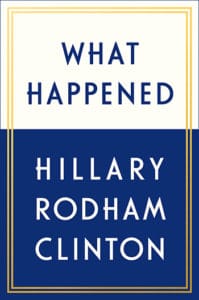In almost 500 pages, Hillary Rodham Clinton’s new memoir What Happened says what many might say in two words: she lost. Her explanation nuances her own personal mistakes, her emails, Russian intervention, Bernie Sanders, sexism, and the intersection of race and class. But this is only a fraction of what makes the book so compelling and important to read. In her own words, Clinton says she’s letting her guard down.
Not unlike her political career, the book has received mixed reviews. Democrats aiming to rebuild the party after Clinton’s loss claim she and her subsequent Hillary Clinton Live book tour are a distraction. Others say presidential candidates don’t immediately write books explaini ng why they lost the election. And finally, there’s the obvious: we’ve been talking about what happened since that early November morning.
ng why they lost the election. And finally, there’s the obvious: we’ve been talking about what happened since that early November morning.
That being said, the book is more than an explanation of why Clinton lost the election and is worth the read for the following three reasons:
Her Prayer Life: Part of what Hillary Clinton recounts in What Happened is her inner spiritual life. She admits early on that many people won’t believe her discussion of her prayer life after the election. One of the reasons for this skepticism is that Rev. Bill Shillady plagiarized spiritual reflections he sent her. Although this may discount Shillady’s credibility, these reflections still shaped her personal prayer during the campaign.
Whether one is skeptical of her prayer life or not, there’s much more to be gained from taking her at her word. She describes how she reread The Return of the Prodigal Son by Henri Nouwen, a book that has guided her prayer for over twenty years. Seeing herself in the position of the older brother, she admits that the book challenges her to the discipline of gratitude:
To be grateful even for our flaws, because in the end, they make us stronger by giving us a chance to reach beyond our grasp. My task was to be grateful for the humbling experience of losing the presidential election… It’s because of our limitation and imperfections that we must reach out beyond ourselves, to God, and to one another.
In what must have been the most painful experience of her life, her experience of gratitude calls her out of her pain and propels her into the future. For each of us who have faced losses in our lives, her story urges us to not allow our hearts to grow bitter, but to continue to find God working on our lives and the lives of others.
The Need for Radical Empathy: During the campaign, Clinton herself admitted it was odd that a presidential candidate would speak about the need for more love and kindness. Her message might have appeared weak to some, but is now more important than ever. She’s calling us to move farther to radical empathy: to “try to walk in the shoes of people who don’t see the world we do.” That includes her. She acknowledges cultural change, lack of belonging, economic insecurity, and even abortion as reasons why someone would see the world differently than her.
While not excusing the unleashing of hate in America since the election, Hillary Clinton urges us to work to build bridges between persons who are different:
We have to fill the emotional and spiritual voids that have opened up within communities, within families, and within ourselves as individuals. That can be even more difficult, but it’s essential. There’s grace to be found in those relationships. Grace and meaning and that elusive sense that we’re all part of something bigger than ourselves.
As her prayer life demonstrates, she’s decided to let go of bitterness and try and build bridges. So too must we.
Embracing Her Own Mistakes, Flaws, and Failures: Many people see the Clintons as thinking they are “above the rules.” Perhaps one way this played out is her admitting throughout the book that she never expected she would lose the election. Furthermore, she’s apologized for not winning the election without blaming her campaign staff. But more than anything, she’s found grace in her mistakes and flaws.
Take one concrete example from the final pages of the book: returning to her alma mater Wellesley to give the 2017 commencement address, she hears the student speaker say that it is our flaws that make us who we are. Listening to the student, she reflects to the reader how she’s learned to see her own flaws as character marks of her own authenticity, something that many see her as hiding over her years in public office.
And perhaps that is why, despite the controversy, Hillary Rodham Clinton has written this book and re-emerged in the public sphere. Perhaps the whole process has been less of a desire to tell what happened that led us to November 8th, 2016. Maybe instead she’s showing us what happened next in her own acceptance of her flaws, mistakes, and public humiliation. Simply said, she’s found grace, gratitude, and healing there.
Her book invite us to do the same. She implicitly asks us for critical self-reflection that is more than just what happened last November. Like her, we’re invited to consider our limited perspectives so that we might stretch them and grow to be radically empathetic. And in the process, she subtly requests us to find what she found – how God is laboring beneath our flaws so that we might find ourselves good enough, strong enough, and ready to move onward together.
-//-
The cover photo is featured courtesy of Ali Shaker/VOA and can be found on the Wikimedia Creative Commons.